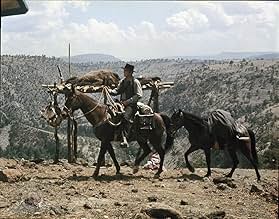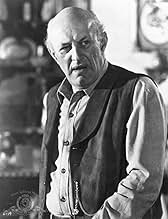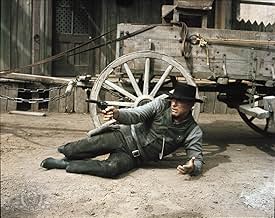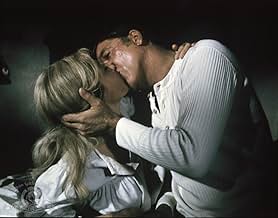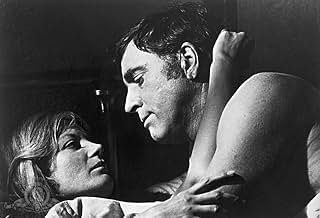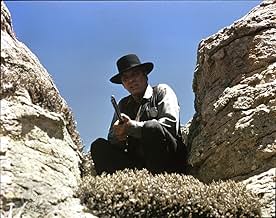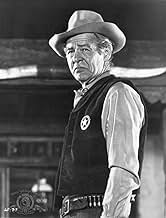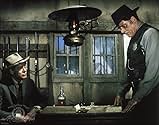AVALIAÇÃO DA IMDb
7,0/10
6,4 mil
SUA AVALIAÇÃO
Um representante da lei Bannock chega no sábado para prender todos os pecuaristas cuja celebração selvagem no ano anterior resultou na morte acidental de um homem idoso.Um representante da lei Bannock chega no sábado para prender todos os pecuaristas cuja celebração selvagem no ano anterior resultou na morte acidental de um homem idoso.Um representante da lei Bannock chega no sábado para prender todos os pecuaristas cuja celebração selvagem no ano anterior resultou na morte acidental de um homem idoso.
William Watson
- Choctaw Lee
- (as William C. Watson)
Enredo
Você sabia?
- CuriosidadesSome scenes were shot in the same Western location town as Howard Hawks's final film, Rio Lobo (1970). Michael Winner says in his autobiography that the crews of both films met in the middle of the town, as in a Western showdown, but without guns.
- Erros de gravaçãoWhen Maddox (Burt Lancaster) shoots the horse out from under Vernon Adams (Robert Duvall), the man who is thrown from the falling horse has a full head of hair, and is clearly a stunt double. Robert Duvall was totally bald on top in this movie. The stuntman even tries to hide the fact by placing his hand right on top of his head as he comes up, but the full head of hair is still visible.
- Citações
Bannock Marshal Jared Maddox: I remember you at Fort Bliss.
Sabbath Marshal Cotton Ryan: That's my trouble. Everybody remembers me at Fort Bliss.
- Versões alternativasAll UK video versions are cut by 4 secs to remove a cruel horse-fall.
- ConexõesFeatured in Sven Uslings Bio: Lawman (2019)
Avaliação em destaque
I rather feel the original "review" on the database misses the point of this dark film. The notion that the community is best served by a rigid, inflexible determination to enforce the letter of the law under all circumstances is indeed the view espoused by the film's main character (played with consummate skill by Burt Lancaster) but the message of the film is surely to point out the limitations of such a view.
Towards the end of the film the Marshall is offered another vision - of a life that contain more than the vendetta, the manhunt, and the inevitable killing that follows. Instead he is tempted by the possibility of a life that offers love, humanity and peace. Unable to change his spots, however, he deliberately throws all that away in a final, senseless act of violence when he shoots in the back a frightened and basically harmless man who is trying to run away - a senseless, brutal and completely unnecessary act of judicial murder. It bears a great resemblance in fact to Harry's similar cold-blooded and pointless execution of his terrorist fugitive at the end of "Harry's Game" and similarly to that, its effect is to arouse disgust at the perpetrator and to alienate our sympathies from what we had previously felt was the "right" side, and to question whether it had really been so "right" all along. The purpose, one feels, of this final killing was not because there was any need for it, but simply to demonstrate the Marshall's defiance of his critics and his determination to continue in the path he had previously followed.
To my mind the film is an intelligent critique of the whole notion of the missionary self-righteousness of this attitude that can arise among self-appointed guardians of the public good, whose original high standards and pure motives are eroded by the violence and the basic inhumanity of the methods they use until they become - as Burt Lancaster actually states in specific terms during the film - just people who are good at killing other people. Siilar themes were explored earlier in "The Searchers" (1956) and "Hang 'em High" (1968) and later in "Unforgiven" (1992) but the message was best expressed to my mind by Peter Shaffer n his play "The Royal Hunt of the Sun" where the young, idealistic but inexperienced squire, Martin, tells his master the conquistador Pizzarro how he feels that a "noble reason" can make the violence of war "glorious". Pizzarro replies: "Give me one reason that stays noble once you start hacking off limbs in its name".
Towards the end of the film the Marshall is offered another vision - of a life that contain more than the vendetta, the manhunt, and the inevitable killing that follows. Instead he is tempted by the possibility of a life that offers love, humanity and peace. Unable to change his spots, however, he deliberately throws all that away in a final, senseless act of violence when he shoots in the back a frightened and basically harmless man who is trying to run away - a senseless, brutal and completely unnecessary act of judicial murder. It bears a great resemblance in fact to Harry's similar cold-blooded and pointless execution of his terrorist fugitive at the end of "Harry's Game" and similarly to that, its effect is to arouse disgust at the perpetrator and to alienate our sympathies from what we had previously felt was the "right" side, and to question whether it had really been so "right" all along. The purpose, one feels, of this final killing was not because there was any need for it, but simply to demonstrate the Marshall's defiance of his critics and his determination to continue in the path he had previously followed.
To my mind the film is an intelligent critique of the whole notion of the missionary self-righteousness of this attitude that can arise among self-appointed guardians of the public good, whose original high standards and pure motives are eroded by the violence and the basic inhumanity of the methods they use until they become - as Burt Lancaster actually states in specific terms during the film - just people who are good at killing other people. Siilar themes were explored earlier in "The Searchers" (1956) and "Hang 'em High" (1968) and later in "Unforgiven" (1992) but the message was best expressed to my mind by Peter Shaffer n his play "The Royal Hunt of the Sun" where the young, idealistic but inexperienced squire, Martin, tells his master the conquistador Pizzarro how he feels that a "noble reason" can make the violence of war "glorious". Pizzarro replies: "Give me one reason that stays noble once you start hacking off limbs in its name".
- piff-1
- 21 de ago. de 2004
- Link permanente
Principais escolhas
Faça login para avaliar e ver a lista de recomendações personalizadas
Everything New on Prime Video in December
Everything New on Prime Video in December
Your guide to all the new movies and shows streaming on Prime Video in the US this month.
- How long is Lawman?Fornecido pela Alexa
Detalhes
- Data de lançamento
- Países de origem
- Idioma
- Também conhecido como
- O Homem da Lei
- Locações de filme
- Empresa de produção
- Consulte mais créditos da empresa na IMDbPro
Bilheteria
- Faturamento bruto nos EUA e Canadá
- US$ 5.940.000
- Tempo de duração1 hora 39 minutos
- Cor
- Proporção
- 1.85 : 1
Contribua para esta página
Sugerir uma alteração ou adicionar conteúdo ausente

Principal brecha
By what name was Mato em Nome da Lei (1971) officially released in India in English?
Responda

